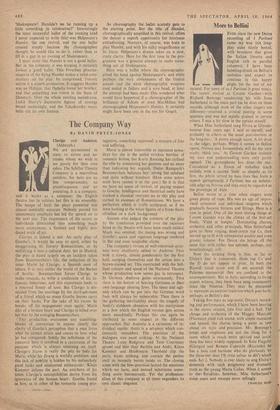The Company Way
By DAVID PRYCE-JONES
Clavigo is indeed a test. An early play of Goethe's, it would be easy to spoil, either by exaggerating its literary Romanticism, or by stultifying it into a cultural duty. Set in Madrid, the play is based largely on an incident taken from Beaumarchais's life, the seduction of his sister Marie by Gavigo, a Spanish man of letters. It is very unlike the world of the Barber of Seville: Beaumarchais forces Clavigo to make amends, to write a confession of his in- famous behaviour, and this repentance leads to a renewed frenzy of love. But Clavigo is dis- suaded from the marriage by the devil-advocate of a friend which so many Goethe heroes carry on their backs. For the sake of his career he breaks off his engagement once again; Marie dies of a broken heart and Clavigo is killed over her bier by the avenging Beaumarchais.
`This production overcomes any stumbling- blocks of convention to expose clearly the clarity of Goethe's perception that a man loves what he cannot attain and ceases .to love what tie has conquered. Subtly the selfishness of the romantic hero is revolved in a cyclorama of the passions which is always returning on itself. Clavigo's Sturm is really the pity he feels for Marie, while his Drang is worldly ambition, and this lack of nobility is hidden by his melancholy good looks and undirected enthusiasm: Klaus Kammer infuses the part. An anti-hero of his times, Clavigo's susceptibilities derive from his
ignorance of the human heart: Goethe found in him, as in other of his romantic young pro- tagonists, something equivocal, a mixture of fear and suffering.
Marie is almost impossible to represent nowa- days for she is the pallid stricken heroine of romantic fiction, but Karin Remsing has stylised the role by minimising her gestures and no more than indicating her anguish. Dieter Ranspach's Beaumarchais balances her; strong but subdued and quite without bombast. (How some actors must have ranted it in the past.) So it is that we have no sense of revival, of paying respect to Goethe. Intelligence and theatrical unity have worked a classical restraint on to this play and curbed its excesses of Romanticism. We have a perfection which is really sculptural, as if we were looking at the white figures of a frieze finely chiselled on a dark background.
Anyone who judged the contents of the play by the translation provided over the receivers hired in the theatre will have been much misled. Much was omitted, the timing was wrong and Goethe's quick and vigorous language rendered in flat and even laughable cliché.
The company's virtues of well-rehearsed quiet- ness were excellently suited to Andorra. They took it slowly, almost ponderously for the first half, merging themselves and the action into a brown-stained set. This contrasted with the bril- liant colours and speed of the National Theatre whose production now seems gay in retrospect. In German Andorra gains enormously. First there is the horror of hearing Germans in their own language abusing Jews. The sneer and ugli- ness which can be put into the German word Jude will always be unbearable. Then there is the gathering inevitability about the tragedy of Andri's stubborn obsession with his martyrdom as a Jew which the English version gets across more anecdotally. Perhaps this can again be attributed in some respect to the different approaches. Our Andorra is a ceremony of in- dividual squibs; theirs is a set-piece which con- tinuously smoulders. The precision of the dialogues was most striking. At the National Theatre Lynn Redgrave and Tom Courtenay sprawl and blur their Barblin and Andri. Klaus Kammer and HeidLmarie Theobald clip the parts, waste nothing, and contain the pathos until its intensity bursts inside us. The closing scene with the Jew-detection lacked the emotions which we have, and instead substitutes some thing more bureaucratic. Yet the profession- alism of this company at all times engenders its own classic elegance.






































 Previous page
Previous page